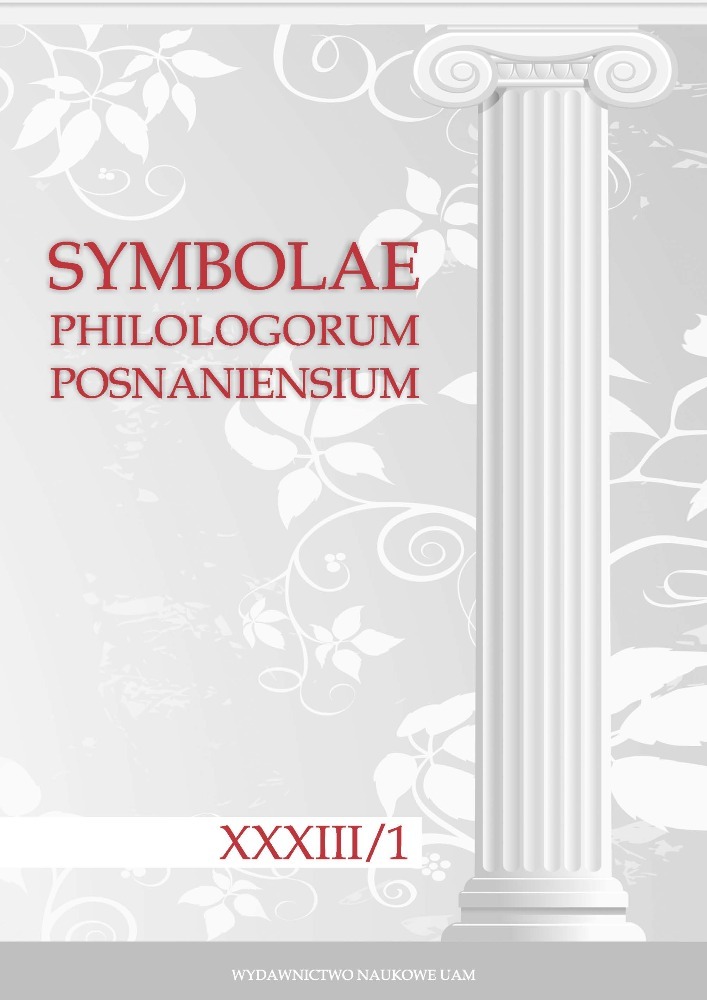Abstrakt
Among the topics discussed by Ovid in Tristia and Epistulae ex Ponto, there is also the topic of gifts. The poet plays the role of both the recipient and the person who can give something to his addressees. In the vast majority of cases, the gifts mentioned are not specific objects, but have an intangible value: the poet perceives the life left to him in terms of a gift, as well as the memory and consolation shown to him by his relatives. He himself wishes to repay the favours received and promises his correspondents eternal fame by including their names in his songs. The Ex Ponto III 8 elegy is unique in this topic. First, Naso notifies the addressee about a material gift sent to him, and secondly, the very gift he decided to offer to his friend is remarkable: a quiver filled with poisoned arrows. Such a gift also played a double role: on the one hand, it reflected the conditions in which the poet found himself, it was, according to his message, the only thing that could be found in Tomis and sent to Rome; on the other hand, it was to serve the recipient to defend himself against his personal enemies. The source texts testify that the arrows dipped in a specific poison were used by the Scythians. The frequency and nature of the mention of this doubly dangerous weapon in both collections of Ovid’s exile poetry, and finally the decision to make it the only material gift sent to the capital, prompted the author of this text to propose a thesis about Ovid’s peculiar fascination with Scythian poisoned arrows.
Bibliografia
J. André, Introduction, w: Ovide, Pontiques, texte établi et traduit par J. André, Paris 1977, I–XLIX.
Arystoteles, Dzieła wszystkie, t. IV, przekł., wstęp, i komentarze A. Paciorek, L. Regner, P. Siwek, Warszawa 1993.
C. Plinii Secundi Naturalis historia, vol. II, libri VII–XV, recens. D. Detlefsen, Berolini 1867.
Cornelii Taciti libri qui supersunt. Tomus prior, Annales continens, iterum recognovit C. Halm, Lipsiae 1863.
F. Della Corte, Ovidio. I Pontica, Volume secondo – Commento, Genova 1974.
C. Formicola, Epistulae ex Ponto Libro III, Introduzione, testo, traduzione, e commento a cura di C. Formicola, Pisa–Roma 2017.
L. Galasso, Introduzione, w: Ovidio, Epistulae ex Ponto, a cura di L. Galasso, Milano 2008, I–LXXVII. DOI: https://doi.org/10.1002/9781444310627.ch14
P. Green, Ovid, The poems of Exile. Translation with introduction, notes and glossary, Harmondsworth 1994.
Herodoti Historiarum libri IX, vol. I, ed. H.R. Dietsch, Lipsiae 1921.
Homeri Ilias. P. 1, Iliadis I–XII, ed. G. Dindorf, Lipsiae 1921. DOI: https://doi.org/10.1093/oseo/instance.00280622
Homeri Odyssea. P. 1, Odysseae I–XII, ed. G. Dindorf, Lipsiae 1925.
Klaudiusz Elian, O właściwościach zwierząt (wybór), przekł., wstęp i przypisy A.M. Komornicka, Warszawa 2005.
B. Larosa, P. Ovidii Nasonis Epistula ex Ponto III 1. Testo, traduzione e commento, Berlin–Boston 2013. DOI: https://doi.org/10.1515/9783110298666
Lucan, The civil war, with an Engl. trans. by J.D. Duff, London 1957.
Ovid, Heroides and Amores, with an English translation by G. Showerman, London 1963.
Ovid, Metaporphoses: in two volumes. 1, Books 1–8, with an English transl. By F.J. Miller, Cambridge 1960.
Ovidio, Epistulae ex Ponto, a cura di L. Galasso, Milano 2008.
Owidiusz, Żale, przeł. M. Puk, E. Wesołowska, wstęp A. Wójcik, oprac. E. Wesołowska, Poznań 2003.
Owidiusz, Poezje wygnańcze, przekł., wybór, i oprac. E. Wesołowska, wstęp A. Wójcik, Bydgoszcz 2006.
A. Pérez Vega, F. Socas Gavilán, Ovidio. Cartas desde el Ponto, Introducciόn, texto de los libro I, III y IV, traducciόn y notas preparados por A. Pérez Vega; texto y traducciόn del libro II preparados por F. Socas Gavilán, Madrid 2000.
P.O. Nasonis Tristium Libri Quinque, Ibis, Ex Ponto Libri Quattuor, Halieutica Fragmenta, ed. S.G. Owen, Oxonii 1959.
Q. Curti Rufi Historiarum Alexandri Magni Macedonis libri qui supersunt, iterum recensuit E. Hedicke, Lipsiae 1931.
U. Staffhorst, Publius Ovidius Naso. Epistulae ex Ponto III 1–3. Kommentar, Würzburg 1965.
Virgil, The Aeneid, transl. into English prose with an introd. by W.F.J. Knight, Harmondsworth 1960.
Babnis 2016: T. Babnis, Obraz barbarzyńców i ich kraju w „Tristia” Owidiusza, praca magisterska napisana pod kierunkiem dra hab. A. Bobrowskiego, Kraków 2016, w: [https://www.academia.edu/26812681/Obraz_barbarzy%C5%84c%C3%B3w_i_ich_kraju_w_Tristia_Owidiusza_MA_in_Classical_Philology].
Batty 1994: R.M. Batty, On Getic and Sarmatian Shores: Ovid’s Account of the Danube Lands, „Historia: Zeitschrift für Alte Geschichte” 431 (1994), z. 1, 88–111.
Blasen 2011: Ph.H. Blasen, De Getis apud Nasonem… La poésie d’Ovide comme source pour l’étude des Gètes, „Analele Banatului” 19 (2011), 109–144.
Cunliffe 2019: B. Cunliffe, The Scythians. Nomad Warriors on the Steppe, Oxford 2019.
Evans 1983: H.B. Evans, Publica carmina: Ovid’s books from exile, Lincoln–London 1983.
Froesch 1968: H.H. Froesch, Epistulae ex ponto I–III als Gedichtsammling, Bonn 1968.
King 2006: Ch. King, Dzieje Morza Czarnego, przeł. Z. Piotrowska, Warszawa 2006.
Mayor 2003: A. Mayor, Grecki ogień, zatrute strzały, bomby skorpionów. Broń chemiczna i biologiczna w świecie starożytnym, przeł. K. Kuraszkiewicz, Warszawa 2006.
Mayor 2015: A. Mayor, Chemical and Biological Warfare in Antiquity, w: History of Toxicology and Environmental Health: Toxicology in Antiquity II, ed. Ph. Wexler, London 2015, 9–20. DOI: https://doi.org/10.1016/B978-0-12-801506-3.00002-9
Musielak 2003: M. Musielak, Społeczeństwo greckich miast zachodnich, Poznań 2003.
Poulle 1990: B. Poulle, Le regard porté par Ovide sur les Gètes, „Bulletin de l’Association Guillaume Budé: Lettres d’humanité” 49 (1990), 345–355. DOI: https://doi.org/10.3406/bude.1990.1753
Syme 1978: R. Syme, History in Ovid, Oxford 1978.
Smirnow 1974: A. Smirnow, Scytowie, Warszawa 1974.
Wasyl 2002: A.M. Wasyl, Rzymski list poetycki. Próba opisania gatunku, Kraków 2002.
Williams 1994: G.D. Williams, Banished Voices: Readings in Ovid’s Exile Poetry, Cambridge 1994.
Zawadzka 2006: A. Zawadzka, Na scytyjskiej ziemi, w: Owidiusz. Twórczość–Recepcja–Legenda, Warszawa 2006.
Żygulski 1998, Z. Żygulski, Broń starożytna, Warszawa 1998.


